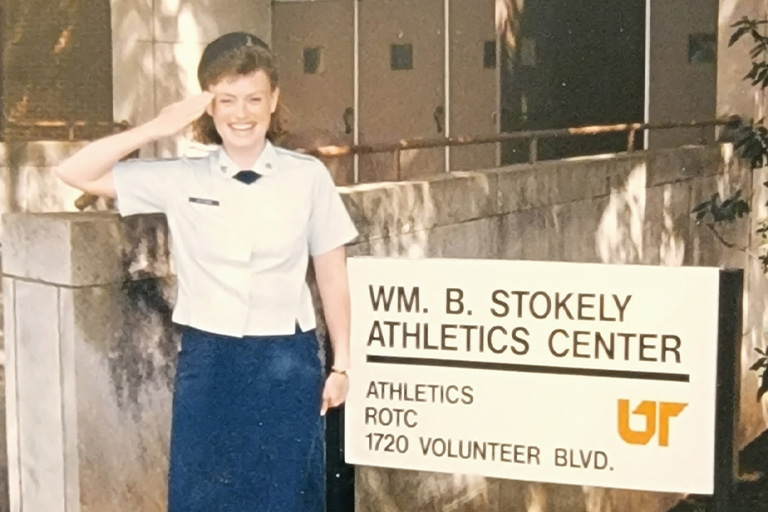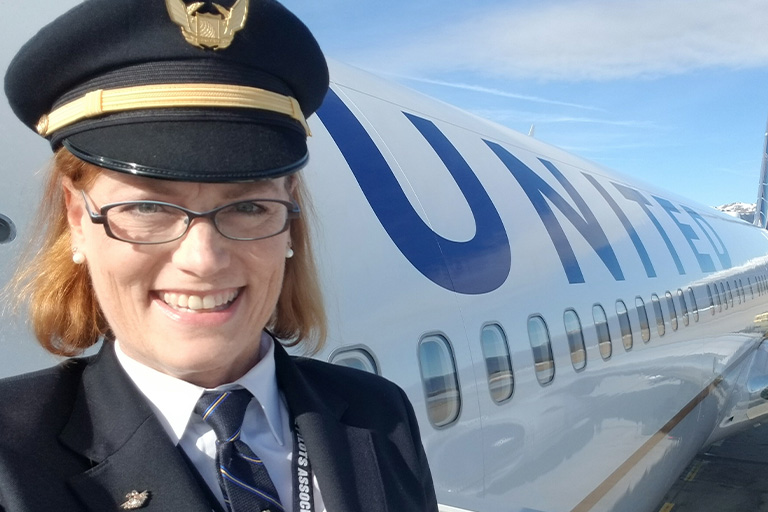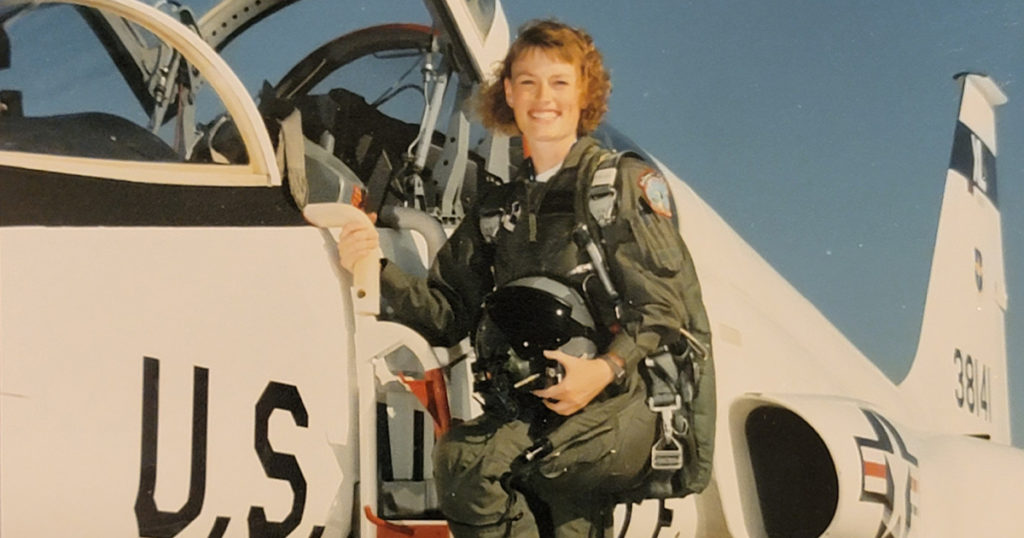Ketterer (’90) Took to the Skies after ISE
Retired Air Force Colonel DeAnna “Dee” Ketterer graduated from the department in 1990 with two things: a degree and a pilot’s license. Now, 32 years later, she’s had a successful career in the US Air Force and United Airlines and is still flying high.
Ketterer remains appreciative for the education she got through industrial engineering at UT, and she recently shared some of those memories.
Question: What high school did you attend? What’s your hometown?
Answer: I was born at Auburn, my dad’s senior year there. I moved to Oak Ridge the summer before first grade, from Iowa City—when my dad graduated from the University of Iowa, with a master’s in physics. I graduated from Oak Ridge High School (GO WILDCATS!) in 1986, where I was a cheerleader and math teacher’s assistant.
Q: What led you to industrial engineering specifically and UT in general?
A: I always knew I would do something with math and/or science, as they are my favorite subjects. My dad’s dad and my dad’s sister were aerospace engineers—and by the way, had their private pilot’s license—so I started by emulating them in aerospace engineering. My sophomore year, I found dynamics to be difficult, the first time a subject stumped me. Given the foundational aspects of dynamics in aerospace engineering and realizing I didn’t want to be in a lab all day, I looked at other engineering disciplines. Industrial engineering combined my love of math/science and interacting with people who love math and science—the best of both worlds! The only thing missing from industrial engineering was airplanes, and it was around that time Air Force ROTC entered my life.
My top three universities were UT, Virginia Tech, and Georgia Tech, all of which are highly rated for engineering. Growing up so close to UT campus, it felt like home already. Ultimately, UT won out because my dad covered my entire undergraduate cost and in-state tuition would save him money (not to mention being close to home for laundry on the weekends). It’s great to be a Tennessee Volunteer!
Q: What memories do you have of your time as a student in the department?
A: I loved being an engineering student at UT. I remember Estabrook Hall, Perkins Hall, and Ferris Hall. I remember trekking up the hallowed Hill to get to Estabrook Hall thinking to myself, “This building is almost 100 years old and has educated thousands of students.” The rich history was inspiring.
Q: Are there any faculty or people who stood out to you in particular?
A: YES! These three professors were not only inspiring in the classroom, they went out of their way to provide mentoring about life.
Dr. Douglas “Hutch” Hutchinson was a wonderful mentor and professor. He inspired me to do my best work with a sense of humor. I worked for him as a graduate assistant in the fall of 1990, while I was waiting to start active duty with the Air Force at undergraduate pilot training.
Dr. Denise Ford Jackson was another mentor and professor. She showed me how to be one of the few women in a male-dominated career field with dignity and grace.
Air Force Major Rich Modell (now a retired colonel), one of my ROTC instructors. He was not only a former instructor, but went on to give me, and many others, sage advice after we were commissioned, while we were on active duty with the Air Force.
Q: How did you become involved with Air Force ROTC?
A: I saw a fellow engineering student wearing a uniform to class on Tuesdays. I asked him about his uniform and he invited me to see Air Force ROTC in the Stokely Athletic Center. The timing of this coincided with changing my major to IE. I could join Air Force ROTC and still be around airplanes! When I joined ROTC, I was going to be an engineer in the Air Force. However, the next year, the Air Force decided everyone physically qualified and testing high enough in pilot aptitudes should go to pilot training.

Q: Can you share any tidbits about your time in the Air Force?
A: I am honored to have served nearly 29 years in the Air Force, 22 of those years on active duty. I was stationed in California, Delaware, Georgia, Illinois, Oklahoma, Texas, Virginia, and Washington as well as overseas in Germany and Italy. I am grateful for my Air Force family, which started in ROTC at UT and continued through my last assignment.
Q: How often have you had a chance to use something you learned here in your Air Force career or now at United?
A: My time at UT provided leadership development opportunities as a member of Pi Beta Phi, in ROTC, and on an IE group project senior year. My success as Air Force officer started with those experiences, and I still use those leadership skills today as an airline pilot.

Q: What advice would you give current or prospective students about the department and about UT?
A: The University of Tennessee Department of Industrial and Systems Engineering provides an innovative learning environment. There are creative approaches to education and students are encouraged to think outside of the box. The University of Tennessee is a gorgeous campus in a wonderful city. That, combined with a talented staff, will make for an amazing college experience!
Q: Do you have any ballpark figure about how many miles you’ve flown, or a favorite aircraft or favorite place you’ve posted?
A: I haven’t kept track of my miles flown; however, I counted the number of countries I visited because of the military (including the US): 58 countries and five continents. I am grateful to say I have visited an additional 15 countries and two continents on vacations.
My favorite aircraft is the mighty C-5 Galaxy. I flew it in the Air Force for 10 years. It is the largest aircraft in the United States, capable of in-flight refueling, and can hold the equivalent of six school buses in the cargo compartment.
Q: Is there anything else you’d like to add, or people you would like to mention?
A: I am grateful for my dad. He covered the cost of my entire engineering degree and always encouraged me to follow my dreams, no matter how few women were in the program.
